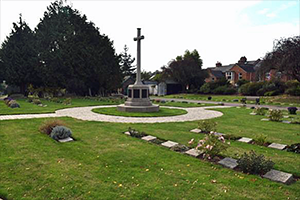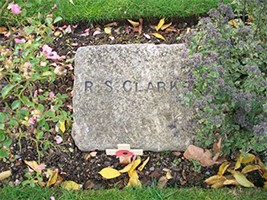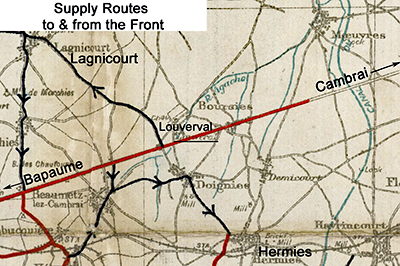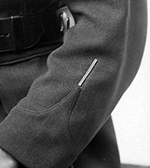First World War Project
Robert Stewart CLARK (of Lynsted)
b. 1898 Private, Service Number 245352 |


Robert's records have been a minefield of false leads and inaccurate reporting. However, we are now confident that Robert was born in May 1898 in Wrens Hill Cottages, Norton. His father, Thomas Simpson Clark, was 1st Whip and Kennel Huntsman for the local hunt, the Tickham Foxhounds. Thomas was a native of Tulney, Berkshire, and Robert's mother, Florence Elizabeth (née Gregory), hailed from Berkeley, Gloucestershire. By the time of the 1911 Census, the family had moved to The Hill, Greenstreet, Lynsted. Robert had an older brother, Thomas Edward, and three younger sisters, Florence Alice, Marion and Violet.
Although registered at birth without a middle name, Robert was christened as Robert "Stewart" on 30 August 1898 in St Mary's Church in his mother's home town of Berkeley. Robert's father predeceased him on 11 October 1911. His mother passed away in June 1941 in Stroud, Gloucestershire, at the age of 81.
We have been unable to find Robert's service records but, via the Register of Personal Effects, where he is incorrectly recorded as Robert "Stuart" Clark, we know he enlisted in Sittingbourne in April 1916. He was just 17 years old. Legally, Robert would not have been eligible for foreign service until his 19th birthday in May 1917.
He eventually embarked for France on 4 October 1917. Just 6 weeks later Robert was wounded during fighting at the Battle of Cambrai (20 November – 6 December).
The regimental war diary during the final month that Robert served in the field reports that there was some relief with the granting of leave and a football competition:
| Date | Summary events and Information |
| 1st November 1917 LOUVERVAL |
The Battalion is in the same Sector that it has occupied since its arrival in this area. Although bad weather continues, work is being energetically carried on and the good condition of the trenches has called forth the commendation of the G.O.C., who has personally toured the Battalion front. An increased Leave Allotment has been granted to the Division and today the addition of an extra four days to the ordinary period of leave, making a fortnight in all, comes into operation. The Battalion has been allotted an appreciable number of vacancies daily and the total number of 50 men absent on leave at one time as is the case at present, compares very favourably with the restricted facilities of the past year. The increased allotment coupled with the introduction of the new system which ensures 14 clear days in ENGLAND has met with the hearty approbation of all ranks. |
| 2nd | In spite of unfavourable weather, our aircraft is fairly active and the enemy artillery continues quiet. |
| 3rd - 6th | The weather is quite mild, although ground mists in the morning hinder observation. Our patrols are out nightly examining the wire on the Battalion front, but on each occasion this has been found to be uncut. Fighting patrols of 30 O.R.s and over in charge of an officer are continuing to reconnoitre NO MAN'S LAND. A hostile patrol was encountered on the evening of the 4th and in the engagement that ensued we sustained one casualty, although it is believed that several of the enemy were effectively disposed of. |
| 7th | The Battalion is to be relieved by the L.R.B. on night of 8th/9th and will move into huts at Divisional Reserve Camp. Although it is intimated that no trains will be available for the relief, permission has been granted for men to board trains used for conveying R.E. material on their return journey. |
| 8/9th | Battalion relieved by the L.R.B. The relief will always be associated with the death, in peculiarly tragic circumstance, of a popular Warrant Officer. No.230936, C.S.M. DAINTY. E.J. who has been killed in a train collision while returning from the line, and the occurrence has cast a shadow of gloom over the whole Battalion. An enquiry is to be held into the affair. The morning is being devoted to cleaning up, and the usual arrangements have been made for the provision of Baths during the present spell in Divisional Reserve. |
| 9th | The funeral of C.S.M. DAINTY took place today. The C.O. Second in Command, and a good many officers, warrant officers, N.C.O.s and men were present at the proceedings which were very impressive. |
| 11th | There is a sudden departure in the style of training from that hitherto carried out. A certain number of men have been earmarked to represent Tanks and artillery flags are being used. New methods of attack are also being practised. The increase in the number of dugouts, the expansion of Dumps and the widening of roads in the forward area, which were noticed during the recent tour of duty appears to foreshadow the early resumption of active operations. |
| 12th | Brigade Instructions No.2(a) received. "Instructions for carrying out Feint Attacks", which states that arrangements are being made for carrying out a feint attack simultaneously along the whole Divisional Front on a day (Z) and hour to be notified later. Dummy figures, Dummy tanks and smoke screens are to be used for this purpose. 169th Infantry Brigade Instructions No.3(a) "Discharge of Smoke on the Divisional Front" in connection with "Feint Attacks" received. |
| 13th | The Commanding Officer is holding frequent conferences with Company Commanders to discuss the impending operations although the day on which the attack is to take place is still a secret. During the period in Divisional Reserve, a Football Competition has been arranged on the knock-out system. A team comprised of Transport personnel, Drums, etc. have beaten "C" Company team in the Final Round. Medals have been presented to the winning team who are also entitled to temporarily retain a silver cup, which has been instituted as a floating trophy. The competition is acting as a good stimulus to the development of recreational training. |
| 14th | Dull day. Information has been suddenly received that the 36th Division will take over the present Camp tomorrow of which we are to be clear by 11.30 a.m. |
| 15th | Battalion operation Order No.61 issued (copy attached). Battalion relieved L.R.B. in LOUVERVAL Subsector this evening. Brigade Instructions No.4(a) received. |
| 17th | 169th Brigade Instructions No.9(a) received. The most rigid adherence to secrecy is enjoined. |
| 18th | Quiet day. Instructions have been received that during the present tour no patrols are to go beyond our own wire. Patrols are out each night examining the wire along the Battalion front. But this was found to be uncut. |
| 19th | Nucleus Personnel [core reserve on which to draw] who had been detailed whilst in Divisional Reserve proceeded to Transport Lines this evening. The following Officers and O.R.s have been earmarked for this purpose:-
Information has been received that Zero day has been fixed for tomorrow and Zero hour is to be 6.20 a.m. |
| 20th | Before dawn, a Dummy Tank was put in position in front of the Left Company by Lt. W.A. FRANCIS, M.C. This was accomplished with great difficulty. Two should have been put up but one unfortunately was completely smashed. At Zero hour smoke bombs were thrown on the whole Battalion front. This was very successful and formed a complete screen. Unfortunately, the Battalion was not included in the initial programme so was only able to assist by making a feint attack. Dummy Figures were also used. Strong patrols were sent out during the night to get in touch with the enemy who were found to be still holding his position in some strength. |
| 21st | During the morning a report was received from Brigade that the enemy was evacuating MOEUVRES. Three strong patrols were at once sent out but on reaching the enemy wire, were fired on by machine guns and forced to withdraw. Orders were then received to be prepared to form a protective flank along the INCHY ROAD. This, however, was not required. |
| 22nd | During the day the majority of the Battalion was employed forming dumps of Ammunition, bombs, etc., and as the Q.W.R. bombed along the German trenches parties were employed repairing the roads across NO MAN'S LAND. A warning order was received to be prepared for an early move in the morning. |
| 23rd | Brigade O.O. No.124 received at 3.30 a.m. The lack of time prevented an issue of a Battalion O.O., so instructions were issued verbally to the O.C. Companies by the C.O. In spite of all endeavours, it was found impossible to reach the assembly positions by Zero hour. The LONDON SCOTTISH who were operating on our left were equally late and in fact both Battalions moved across the open at daybreak to get to their positions. A new Zero hour was mutually arranged by the two C.O.s and the bombing attack launched. For six hours, in spite of frequent attempts, no advance was made by either Battalion owing to the strength of the German bombing blocks. The Battalion managed to get up the three enemy communication trenches to the wire entanglements and were then unable to progress at all. 2nd Lieut F.H.C. LUDLOW was killed trying to get across the open and it was realised that the task was beyond achievement without artillery preparation or the aid of Tanks. The C.O. realising this, informed Brigade and put his supporting Company to help the LONDON SCOTTISH who had managed to get on as they were working laterally. |
| 24th | Orders have been received to consolidate the position and Brigade O.O. 125 being received detailing new boundaries. The work of consolidation was proceeded with energetically. Brigade Operation Order No.126 received. By arrangement with the C.O. of the SCOTTISH it was decided to hold the original position until he was sufficiently reinforced to take over more line. This was done later in the morning on the arrival of two Companies of the 4th LONDONS. At 3 p.m. the enemy counterattacked but failed to reach the position held by the 2nd LONDONS. The 4th LONDON bombing block however, formed only 30 yards from the Brigade boundary. The position was now very precarious. The C.O.s of 2nd LONDON and L.R.B. each placed a strong platoon at the disposal of the SCOTTISH. The platoon of the former was intended for a further attack but it was eventually decided that a carefully arranged operation of greater strength would be required. |
| 25th | The morning was quiet and the usual German artillery and Machine Gun activity had apparently ceased. At 12.30 p.m. however, when the flank Brigade attacked, the hostile artillery &C opened in full force. Conflicting reports arrived as to the progress of the fight. At about 3 p.m. the "S.O.S." was sent up by the left of the RANGERS. This call was repeated continuously for quite two hours, but beyond a heavy barrage no change took place on the Battalion front. At 5.30 p.m. Brigade O.O. No.127 was received. This order was completed by 10.30 p.m. and the Battalion having been relieved by the Q.V.R. moved back into the old British Front Line in the Right LOUVERVAL Sector. |
| 26th-28th | The Battalion rested during the day and at night the whole Battalion worked on a new communication trench across the old NO MAN'S LAND, joining up the old front line to a sunken road running to the HINDENBURG LINE. Brigade O.O. No.128 Received. |
| 29th | Battalion Operation Order No. 64 issued. Battalion relieved QVR in Left Subsector this evening. "D" and "C" Companies being in the front line, with "A" and "B" Companies in support. Relief was complete by 9 p.m. |
The diary for the day of Robert's injury describes the action he was faced with:
| Date | Summary events and Information |
| 30th November | After a very quiet night hostile artillery commenced in certain amount of harassing fire on our trenches at about 6 a.m. At 7.30 a.m. it was reported from the line that large parties of the enemy were to be seen North of MOEUVRES and round QUARRY WOOD. Orders were given to "stand to" at 8 a.m. as it appeared evident that the enemy were preparing for an offensive. Large bodies of the enemy were seen attacking to the East. Hostile Batteries and Cavalry were clearly seen. By 8.30 a.m. a very heavy bombardment was put down on our lines, hostile Trench Mortars firing very accurately especially on the Left Company front. As the enemy left their trenches, a very hot fire was opened on them with Rifles and Lewis Guns, and "S.O.S." Rockets were sent up. We appeared to be holding up the enemy on our front, but unfortunately he had managed to get down the old C.T.s on each of our flanks and attacked our two front line Companies on either flank and in rear so that they were forced to withdraw down the C.T.s. The enemy got right through on our left and started bombing the Support Line dugouts. A counter-attack was at once led by Captain BAKER and the enemy driven back to our old front line which we were unable to retake. Blocks were formed in the C.T.s and two Companies of Q.V.R. arrived as reinforcements so that by nightfall our position was fairly secure and the enemy's effort frustrated. At 5.30 p.m. orders were received for relief by the 3rd LONDONS which were carried out. Relief being complete at 4.30 a.m. |
Battalion casualties recorded for November totalled:
Officers: 1 killed, 3 wounded, 1 missing. Other ranks: 16 killed, 116 wounded, missing 52.
 Robert records, again inaccurately identifying his as "R S Clarke", somewhat downplays his injuries. He was admitted to a Casualty Clearing Station on 1 December 1917 where his wound was classified as "Gunshot wound IX, 1 High Explosive". The Army Wound Classification System of Roman numerals explains "IX" = gunshot wound to the lower extremities, and "1" = Simple flesh contusion or wound.
Robert records, again inaccurately identifying his as "R S Clarke", somewhat downplays his injuries. He was admitted to a Casualty Clearing Station on 1 December 1917 where his wound was classified as "Gunshot wound IX, 1 High Explosive". The Army Wound Classification System of Roman numerals explains "IX" = gunshot wound to the lower extremities, and "1" = Simple flesh contusion or wound.
He was transferred to Sick Convoy the next day and transported by the 4th London Field Ambulance to the No 29 Hospital Train to the hospital in Rouen. It is here that the true extent of his injuries are learned. He had in fact suffered a severe injury by shell fire shattering his left foot. The wounds were obviously serious and required the foot to be amputated.
At some time later, Robert was evacuated to the Exeter War Hospital, Devon. It was here he was recommended for a "wound stripe". These had been introduced in 1916, with the approval of King George V. The British Army began awarding a brass stripe to be worn vertically on the left forearm, fastened through the uniform cloth. Additional badges were granted for subsequent wounds.
  "The following distinctions in dress will be worn on the service dress jacket by all officers and soldiers who have been wounded in any of the campaigns since 4th August, 1914:- "The following distinctions in dress will be worn on the service dress jacket by all officers and soldiers who have been wounded in any of the campaigns since 4th August, 1914:-Strips of gold Russia braid, No.1, two inches in length, sewn perpendicularly on the left sleeve of the jacket to mark each occasion on which wounded. In the case of officers, the lower end of the first strip of gold braid will be immediately above the upper point of the flap on cuff. Warrant officers, non-commissioned officers and men will wear the gold braid on the left sleeve, the lower edge of the braid to be three inches from the bottom of the sleeve. The additional strips of gold braid, marking each subsequent occasion on which wounded, will be placed on either side of the original one at half-inch interval. Gold braid and sewings will be obtained free on indent from the Army Ordnance Department; the sewing on will be carried out regimentally without expense to the public." |
Sadly, Robert succumbed to his injuries a month later on 5 January 1918.
A report explains that Robert's mother and elder brother were able to attend his funeral. Something that so many other families had not been able to do:
| East Kent Gazette of 5th January 1918 |
PRIVATE R S CLARK, OF GREENSTREET. We have to record the death of another promising lad of Greenstreet, in the person of Private R. Stuart Clark, of the Royal East Kent Mounted Rifles (attached to The Buffs), who died of wounds in Hospital, at Exeter, on the 5th instant. The young man, who was the younger son of the late Mr. Tom Clark, formerly huntsman to the Tickham Foxhounds, and of Mrs F Clark, of the Hill, Greenstreet, was only 19 years of age last May. The young soldier was formerly cashier at the Greenstreet Cooperative Society's shop. He joined up at the outbreak of the war long before he was 18 years of age. Owing to age restrictions, however, he was not sent out to France until October 4th of last year. On November 30th he had his left foot shattered by a shell and it was amputated in Rouen Hospital, France. Eventually he was transferred to the War Hospital at Exeter, Devon, where he passed away as stated. He was laid to rest at Exeter on Wednesday in last week, full military honours being paid him. The funeral was attended by the mother and elder brother, as well as by a party of nurses and wounded soldiers. The floral tributes were very beautiful. Much sympathy is felt in the neighbourhood for the widowed mother, whose elder son is also serving in the Army, being a gunner of the R.G.A. A memorial service was held at Lynsted Parish Church on Sunday last, when the Vicar (the Rev. T.J. Sewell) officiated. |
Robert is buried in Exeter Higher Cemetery, Devon. Grave Ref: 142
Robert is commemorated on the Lynsted memorial plaque in his original regiment of the Royal East Kent Yeomanry.
Robert's medal records were found via his service number incorrectly recorded as "Herbert" S Clark. He was posthumously awarded the British War and Victory medals. [See Appendix 1]
In May 1918, Robert's family received his money owing. His mother received £6 4s 3d (£6.21p). His brother Thomas and sisters Florence and Marion received £3 2s 1d (£3.10½p) each. In February 1919 his mother received an additional £1 4s 9d (£1.24p). Later, in December 1919, she received his War Gratuity of £8. [See Appendix 2] Taken together these amount to roughly £860 in today's money.

 World War 1 Pages
World War 1 Pages